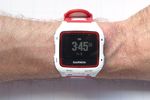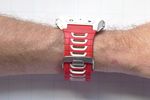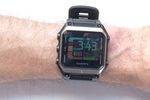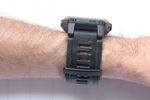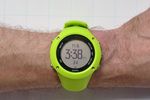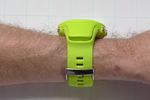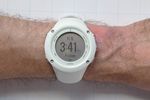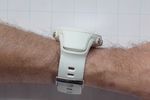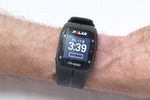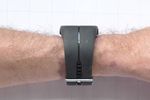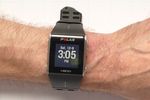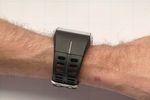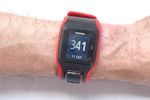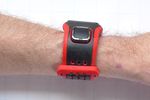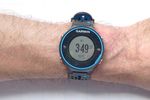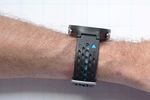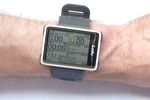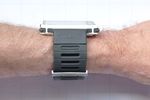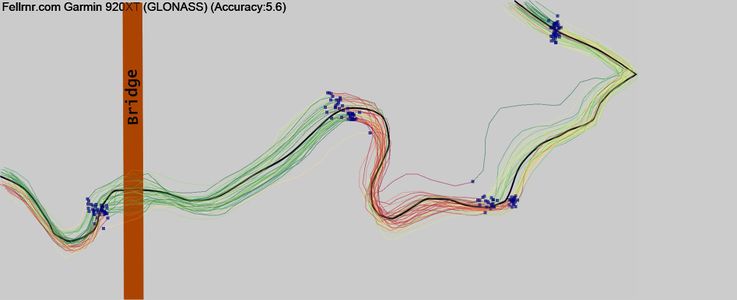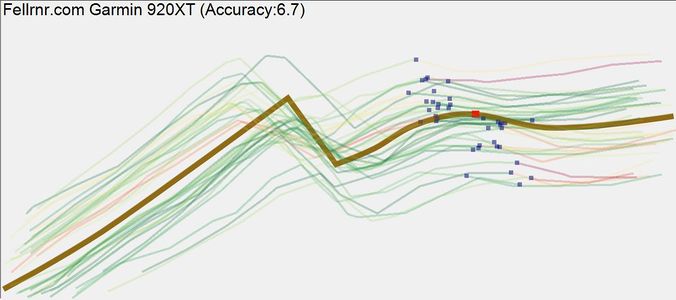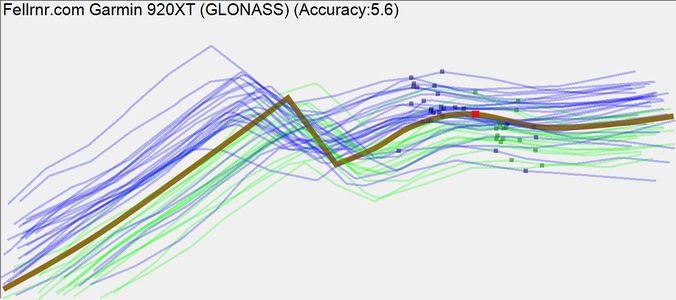Difference between revisions of "Garmin 920XT"
User:Fellrnr (User talk:Fellrnr | contribs) |
User:Fellrnr (User talk:Fellrnr | contribs) m (comment: batch update) |
||
| (13 intermediate revisions by the same user not shown) | |||
| Line 1: | Line 1: | ||
{{DISPLAYTITLE:Garmin 920XT Review}} | {{DISPLAYTITLE:Garmin 920XT Review}} | ||
[[File:Garmin920XT.png|thumb|right|200px|The {{Garmin 920XT}}, showing the display of Cadence, Vertical Oscillation and Ground Contact Time.]] | [[File:Garmin920XT.png|thumb|right|200px|The {{Garmin 920XT}}, showing the display of Cadence, Vertical Oscillation and Ground Contact Time.]] | ||
| − | The Garmin 920XT is an update to the [[Garmin 910XT]], adding many of the features from the [[Garmin 620]], while shrinking in size to become far less bulky than its predecessor. It's a large watch, but I found it comfortable even on my tiny wrists. Its [[GPS Accuracy]] is disappointing, and using the Russian GLONASS satellites makes this worse. However, the 920XT is the first of several watches in the Garmin range to support the revolutionary [[Connect IQ]]. This will allow the 920XT to run | + | The Garmin 920XT is an update to the [[Garmin 910XT]], adding many of the features from the [[Garmin 620]], while shrinking in size to become far less bulky than its predecessor. It's a large watch, but I found it comfortable even on my tiny wrists. Its [[GPS Accuracy]] is disappointing, and using the Russian GLONASS satellites makes this worse. However, the 920XT is the first of several watches in the Garmin range to support the revolutionary [[Connect IQ]]. This will allow the 920XT to run applications, much like a smartphone. The 920XT has a clear display, real buttons, and rich functionality that make it an attractive option if you can afford it. The [[Connect IQ]] extensibility adds some potential future proofing. For a [[Best Running Watch| simple evaluation of a GPS watch]], I look at how well it can answer some basic questions: |
| − | + | * '''How far did I run?''' This is the most basic question, and sadly, the 920XT has rather middling [[GPS Accuracy]], and while firmware updates might improve this slightly, I doubt it will get close to the accuracy of the [[Polar V800]]. The level of error will depend on your route; on straight lines it will be remarkably accurate (as will any other GPS watch), but on a twisty course like the one I run on, it is out by around 0.5 miles on a 20 mile run. That's enough to mess up your marathon training. If this is important to you, look for a more accurate watch. | |
| − | + | * '''How fast am I running?''' Knowing how fast you're running can be a nice to know, or it can be vital for your training or race performance. Because of the nature of GPS, watches that rely on GPS signal alone tend to have serious problems with current pace. Thankfully, Garmin has added support for the display of current [[Pace From A Footpod]] while getting all other data from GPS. | |
| − | + | * '''Where am I? '''The 920XT has some basic navigation functions. | |
| − | + | ** '''Track Outline'''. There is a display of where you've run, rather like a breadcrumb trail. There are no maps, so this is just the outline on its own without any context. However, you can use it to backtrack along your path. | |
| − | + | ** '''Course Outline'''. This is an outline of a route that can be downloaded. I've found this useful during ultras or in unfamiliar cities where I've needed to know where to go. | |
| − | + | ** '''Back To Start'''. This is a simple arrow point to your starting point, so it won't help you backtrack. | |
| − | * | + | ** '''Back To Waypoint'''. You can mark a location and use the arrow to point to it later. Again, this is a simple "as the crow flies" pointer. |
| − | * | + | ** '''GPS "Compass"'''. There's no magnetic compass so you have to be moving for the GPS to give you a sense of direction. |
| − | + | * '''What's my cadence? '''[[Cadence]]''' '''is one of the most critical and often overlooked aspects of running. If you get your Cadence right, many other things naturally fall into place. Not only does the 920XT get [[Cadence]] from a [[Footpod]], it will also get it from the Garmin Run Heart Rate monitor. There is also support for Cadence from the internal accelerometer, though I find that's not as accurate. The Cadence alerts are especially useful for keeping you on track. | |
| + | For ultramarathon running the battery life of the 920XT makes it a strong candidate for shorter races (50 miles/100k). But if you hope to be still moving during the [[Second Dawn]], then you should look elsewhere. See [[Best Running Watch#Watches for Ultrarunning| Watches for Ultrarunning]] for more details. | ||
| + | {{BuyAmazon|AZID=B00O4D4KPA|AZN=Garmin 920XT}} | ||
=Garmin 920XT Pros= | =Garmin 920XT Pros= | ||
* The 920XT supports Garmin's Connect IQ, which allows for the creation of apps in much the same way you can run apps on Android or iOS. Just like the original iPhone, this has the potential to be revolutionary, making the 920XT an extensible platform for future functionality. | * The 920XT supports Garmin's Connect IQ, which allows for the creation of apps in much the same way you can run apps on Android or iOS. Just like the original iPhone, this has the potential to be revolutionary, making the 920XT an extensible platform for future functionality. | ||
| + | * Garmin has added support for displaying your current [[Pace From A Footpod]] while getting all other data from GPS. For situations where pacing is critical, such as running a marathon, this is a must have feature. You can also configure it to get both pace and distance from the Footpod, while still recording the track of where you've been from GPS. | ||
* The 920XT is quite a bit bigger than devices like the [[Garmin 620]] that look more like a traditional watch. However, I have tiny wrists (less than 6 inches) and I found 920XT was far more comfortable than watches like the [[Polar V800]]. | * The 920XT is quite a bit bigger than devices like the [[Garmin 620]] that look more like a traditional watch. However, I have tiny wrists (less than 6 inches) and I found 920XT was far more comfortable than watches like the [[Polar V800]]. | ||
* The display on the 920XT is color and a good size that is easier to read than some watches. Unlike the [[Garmin 620]], the color display on 920XT is quite strong. I'm not sure that color adds much functionality, but it does make the 920XT more visually appealing. While the 920XT has a slightly smaller display than its predecessor, the 910XT, it has nearly twice the resolution, creating a far crisper display. | * The display on the 920XT is color and a good size that is easier to read than some watches. Unlike the [[Garmin 620]], the color display on 920XT is quite strong. I'm not sure that color adds much functionality, but it does make the 920XT more visually appealing. While the 920XT has a slightly smaller display than its predecessor, the 910XT, it has nearly twice the resolution, creating a far crisper display. | ||
| − | * Like the Garmin 620 and Fenix | + | * Like the [[Garmin 620]] and [[Garmin Fenix 3]], the 920XT supports [[Running Dynamics]] which can show and record [[Cadence]], Vertical Oscillation (VO) and Ground Contact Time (GCT). The 920XT has a nice display of Cadence, VO, and GCT that gives a color coded indication of how well you're doing. |
* The 920XT can be configured to alert you when a metric is out of range. The alert for [[Cadence]] is particularly useful. The Cadence alert will work when it's using the internal accelerometer for Cadence, as well as the HRM-Run strap or a Footpod. | * The 920XT can be configured to alert you when a metric is out of range. The alert for [[Cadence]] is particularly useful. The Cadence alert will work when it's using the internal accelerometer for Cadence, as well as the HRM-Run strap or a Footpod. | ||
* There is a metronome to help you keep your Cadence where it should be, which is a really nice feature. The metronome can be set to make a sound and/or vibrate. The vibration option is nice so you don't annoy people you're running with. You can set the alert to go off every second, fourth, or sixth beat. | * There is a metronome to help you keep your Cadence where it should be, which is a really nice feature. The metronome can be set to make a sound and/or vibrate. The vibration option is nice so you don't annoy people you're running with. You can set the alert to go off every second, fourth, or sixth beat. | ||
| Line 25: | Line 28: | ||
* The 920XT will upload your workouts to Garmin Connect via WiFi without needing a computer. It will also link to a smart phone to upload a workout as it takes place, which is nice for folks tracking you during a race, though it means wearing the watch and the phone together. If you plug the 920XT into a computer it will function as a flash drive, giving you direct access to your workouts as '.FIT' files. This provides compatibility with a wide range of software. | * The 920XT will upload your workouts to Garmin Connect via WiFi without needing a computer. It will also link to a smart phone to upload a workout as it takes place, which is nice for folks tracking you during a race, though it means wearing the watch and the phone together. If you plug the 920XT into a computer it will function as a flash drive, giving you direct access to your workouts as '.FIT' files. This provides compatibility with a wide range of software. | ||
* The 920XT will not display [[Heart Rate Variability]] but it is possible for it to record [[Heart Rate Variability]] for later analysis. To enable this recording, you need to download a special FIT file from the firstbeat.com web site. (It's quite probable that [[Connect IQ]] will enable apps to provide this functionality in the future.) | * The 920XT will not display [[Heart Rate Variability]] but it is possible for it to record [[Heart Rate Variability]] for later analysis. To enable this recording, you need to download a special FIT file from the firstbeat.com web site. (It's quite probable that [[Connect IQ]] will enable apps to provide this functionality in the future.) | ||
| − | * | + | * While Garmin claims a 24 hour battery life, I found that 19 hours is more likely even under optimal conditions (no backlight, no button presses.) That 19 hours is good enough for many shorter ultramarathons, and the extended mode allows for 50 hours with degraded GPS accuracy might be viable for you. In my informal testing of the extended mode, the 920XT did not perform as badly as I expected. Unlike some other Garmin watches, such as the [[Garmin Fenix 3]], you can't charge the 920XT while you're running. I find charging on the run is a pain, but it's nice to have the option. |
| + | * There is a nice display that shows the route you've taken for navigation, but there is no support for displaying a map; you need the [[Garmin Epix]] for that. | ||
* You can use the 920XT as an activity monitor, something that's common to many new sports watches. However, because the 920XT is only using its internal accelerometer the activity estimates are rather poor. If you need an activity monitor, I'd recommend the [[Basis Activity Tracker]] which has sensors for heart rate, skin temperature and perspiration. | * You can use the 920XT as an activity monitor, something that's common to many new sports watches. However, because the 920XT is only using its internal accelerometer the activity estimates are rather poor. If you need an activity monitor, I'd recommend the [[Basis Activity Tracker]] which has sensors for heart rate, skin temperature and perspiration. | ||
* The 920XT will record your personal best performances, such as fasted 5K or longest distance. These are a nice novelty, but for most people you won't be setting PR's on a regular enough basis for it to add much value. | * The 920XT will record your personal best performances, such as fasted 5K or longest distance. These are a nice novelty, but for most people you won't be setting PR's on a regular enough basis for it to add much value. | ||
=Garmin 920XT Cons= | =Garmin 920XT Cons= | ||
| − | |||
| − | |||
* The 920XT includes an internal accelerometer to give you an idea of pace and distance while running on a treadmill without a footpod, but I found the accuracy was rather poor. I've yet to come across a watch that can reasonably estimate your pace from the movement of your wrist, nor does it seem likely that this functionality is practical. | * The 920XT includes an internal accelerometer to give you an idea of pace and distance while running on a treadmill without a footpod, but I found the accuracy was rather poor. I've yet to come across a watch that can reasonably estimate your pace from the movement of your wrist, nor does it seem likely that this functionality is practical. | ||
* You need to have the new HRM for the new features. It will display Heart Rate and calculate [[Firstbeat| Training Effect]] with the older Garmin HRM, but not Ground Contact Time or Vertical Oscillation. | * You need to have the new HRM for the new features. It will display Heart Rate and calculate [[Firstbeat| Training Effect]] with the older Garmin HRM, but not Ground Contact Time or Vertical Oscillation. | ||
| − | * The 920 XT is not unattractive in a rather plastic way, but it's nowhere near as elegant and stylish as the [[Polar V800]]. | + | * The 920 XT is not unattractive in a rather plastic way, but it's nowhere near as elegant and stylish as the [[Polar V800]] or the [[Garmin Fenix 3]]. |
=Comparisons= | =Comparisons= | ||
| − | Here are some of the watches that | + | Here are some of the watches that are competitors for the 920XT: |
* [[Garmin 620]]. The features of the 620 are remarkably similar to the 920XT. The 620 is smaller, but has a shorter battery life. However, the biggest difference between the two is that the 920XT has the [[Connect IQ]] extensibility. I think that the extensibility of the 920XT makes it well worth the price premium over the 620, so only get the 620 if its small size is critical to you. | * [[Garmin 620]]. The features of the 620 are remarkably similar to the 920XT. The 620 is smaller, but has a shorter battery life. However, the biggest difference between the two is that the 920XT has the [[Connect IQ]] extensibility. I think that the extensibility of the 920XT makes it well worth the price premium over the 620, so only get the 620 if its small size is critical to you. | ||
| − | * [[Garmin 610]]. The 610 the predecessor to the [[Garmin 620]] and its price has dropped to make it an attractive option. While the 610 lacks many of the cool new features of the 620/920XT, it performs the core functionality you need is a runner as well as (or better than) the newer devices. | + | * [[Garmin 610]]. The 610 the predecessor to the [[Garmin 620]] and its price has dropped to make it an attractive option. While the 610 lacks many of the cool new features of the 620/920XT, it performs the core functionality you need is a runner as well as (or better than) the newer devices. I would recommend giving the Garmin 610 serious consideration, even though it's an older device. |
* [[Garmin 310XT]]. Like the 610, the 310XT is older and its price has dropped nicely. You could think of the 310XT as a larger 610 with better battery life. | * [[Garmin 310XT]]. Like the 610, the 310XT is older and its price has dropped nicely. You could think of the 310XT as a larger 610 with better battery life. | ||
* [[Garmin 910XT]]. The 910XT is a little better than the 310XT, but quite a lot more expensive. Until the price of the 910XT drops to be much closer to the 310XT, I don't think it's worth it; buy the 310XT or the 920XT, not the 910XT. | * [[Garmin 910XT]]. The 910XT is a little better than the 310XT, but quite a lot more expensive. Until the price of the 910XT drops to be much closer to the 310XT, I don't think it's worth it; buy the 310XT or the 920XT, not the 910XT. | ||
| − | * [[Polar V800]]. The V800 is a far more elegant watch than the 920XT, and is beautifully made. The V800 also has outstanding GPS accuracy, which makes it a strong contender for your money. However the V800 is quite expensive, and it can only display your [[Cadence]] if you're using the enormous Polar | + | * [[Polar V800]]. The V800 is a far more elegant watch than the 920XT, and is beautifully made. The V800 also has outstanding GPS accuracy, which makes it a strong contender for your money. However the V800 is quite expensive, and it can only display your [[Cadence]] if you're using the enormous Polar Stride Sensor. I believe that Cadence is so critical to efficient running and injury prevention that I find it hard to recommend the V800. |
=What's Missing= | =What's Missing= | ||
While I don't consider these missing features as 'cons', it's worth understanding the features that are missing compared with other watches. You'll notice that the 920XT has a rather short list of missing features ;} | While I don't consider these missing features as 'cons', it's worth understanding the features that are missing compared with other watches. You'll notice that the 920XT has a rather short list of missing features ;} | ||
* '''Graphs'''. Instead of simply displaying a numeric value for things like heart rate, some watches will display a graph of the value over time, giving you a sense of how things are progressing. (As mentioned earlier, [[Connect IQ]] will add this functionality.)) | * '''Graphs'''. Instead of simply displaying a numeric value for things like heart rate, some watches will display a graph of the value over time, giving you a sense of how things are progressing. (As mentioned earlier, [[Connect IQ]] will add this functionality.)) | ||
* '''Web Configuration'''. Some watches allow you to setup the configuration via a web site, and then download your changes. This is vastly easier than fiddling with the watch. | * '''Web Configuration'''. Some watches allow you to setup the configuration via a web site, and then download your changes. This is vastly easier than fiddling with the watch. | ||
| − | = | + | =Visual Comparison= |
| − | { | + | {| class="wikitable" |
| + | |- valign="top" | ||
| + | |[[File:Garmin 920XT-top.JPG|none|thumb|150px|Garmin 920XT top]] | ||
| + | |[[File:Garmin 920XT-side.JPG|none|thumb|150px|Garmin 920XT side]] | ||
| + | |[[File:Garmin Epix-top.JPG|none|thumb|150px|Garmin Epix top]] | ||
| + | |[[File:Garmin Epix-side.JPG|none|thumb|150px|Garmin Epix side]] | ||
| + | |- valign="top" | ||
| + | |[[File:Suunto Ambit3-top.JPG|none|thumb|150px|Suunto Ambit3 top]] | ||
| + | |[[File:Suunto Ambit3-side.JPG|none|thumb|150px|Suunto Ambit3 side]] | ||
| + | |[[File:Suunto Ambit2-top.JPG|none|thumb|150px|Suunto Ambit2 top]] | ||
| + | |[[File:Suunto Ambit2-side.JPG|none|thumb|150px|Suunto Ambit2 side]] | ||
| + | |- valign="top" | ||
| + | |[[File:Polar M400-top.JPG|none|thumb|150px|Polar M400 top]] | ||
| + | |[[File:Polar M400-side.JPG|none|thumb|150px|Polar M400 side]] | ||
| + | |[[File:Polar V800-top.JPG|none|thumb|150px|Polar V800 top]] | ||
| + | |[[File:Polar V800-side.JPG|none|thumb|150px|Polar V800 side]] | ||
| + | |- valign="top" | ||
| + | |[[File:TomTom Cardio Runner-top.JPG|none|thumb|150px|TomTom Cardio Runner top]] | ||
| + | |[[File:TomTom Cardio Runner-side.JPG|none|thumb|150px|TomTom Cardio Runner side]] | ||
| + | |[[File:Garmin 620-top.JPG|none|thumb|150px|Garmin 620 top]] | ||
| + | |[[File:Garmin 620-side.JPG|none|thumb|150px|Garmin 620 side]] | ||
| + | |- valign="top" | ||
| + | |[[File:Leikr 1-top.JPG|none|thumb|150px|Leikr 1 top]] | ||
| + | |[[File:Leikr 1-side.JPG|none|thumb|150px|Leikr 1 side]] | ||
| + | |} | ||
| + | =GPS Accuracy = | ||
| + | The Garmin 920XT has middling [[GPS Accuracy]]; neither the worst nor the best. | ||
| + | * The 920XT does well going under the bridge, an indication that it is not having excessive problems with reacquisition. | ||
| + | * On the out-and-back turnaround the 920XT does poorly, but no worse than I'd expect given its overall accuracy. | ||
| + | * Running in a straight line is a fairly easy task for most GPS watches, and the 920XT does okay. | ||
| + | * I've not had any issues with the 920XT acquiring or maintaining the GPS signal, unlike some other devices. | ||
| + | {| class="wikitable" | ||
| + | |- valign="top" | ||
| + | |[[File:BridgeGarmin 920XT.jpg|none|thumb|x300px| The 920xt does surprisingly well under the bridge and no issues reacquiring the GPS signal. It does poorly around the twisty section, often cutting the corners which results in a short measurement. It does okay with the sharp turn seen on the right side of the diagram. Notice that the tracks are quite spread out, especially if you compare them with the [[TomTom_Cardio_Runner#GPS_Accuracy| TomTom's tracks]]. (This diagram has tracks color coded with green indicating good accuracy through to read indicating poor accuracy, and the lap markers as blue dots.)]] | ||
| + | |[[File:BridgeGarmin 920XT (GLONASS).jpg|none|thumb|x300px| With GLONAS enabled, the accuracy through the bends is a lot worse, and the section with the sharp turn is also poor.(This diagram has tracks color coded with green indicating good accuracy through to read indicating poor accuracy, and the lap markers as blue dots.)]] | ||
| + | |- valign="top" | ||
| + | |[[File:AccuracyGarmin 920XT.jpg|none|thumb|x300px| This close up section of a zigzag shows the 920XT follows the line of the course, but is offset more than other devices. (This diagram has tracks color coded with green indicating good accuracy through to read indicating poor accuracy, and the lap markers as blue dots.)]] | ||
| + | |[[File:AccuracyGarmin 920XT (GLONASS).jpg|none|thumb|x300px| In the close up with GLONAS, the lap markers are slightly more distributed. If you look at the image below that shows direction of travel as color, you can see that the 920XT with GLONAS is having accuracy problems in the section to the right of the diagram, but only when traveling east-to-west. This is a surprisingly common phenomenon, where a watch has a dramatic difference in accuracy depending on the direction of travel. (This diagram has tracks color coded with green indicating good accuracy through to read indicating poor accuracy, and the lap markers as blue dots.)]] | ||
| + | |- valign="top" | ||
| + | |[[File:ZigZagGarmin 920XT.jpg|none|thumb|x300px| Here the 920XT displays the typical GPS behavior with the tracks that have the green lines shifted slightly down and to the left, blue up and to the right. You can see the lap markers similarly shifted. (This image has the tracks color-coded for direction, with green coming from the right, blue from the left.)]] | ||
| + | |[[File:ZigZagGarmin 920XT (GLONASS).jpg|none|thumb|x300px| Activating GLONAS seems to cause more a random looking distribution, rather than the clear shift of blue and green lines. However, the lap markers remain offset. (This image has the tracks color-coded for direction, with green coming from the right, blue from the left.)]] | ||
| + | |} | ||
=Comparison Table= | =Comparison Table= | ||
{{:Best Running Watch-table}} | {{:Best Running Watch-table}} | ||
Latest revision as of 15:00, 10 May 2017
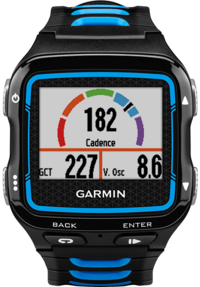
The Garmin 920XT is an update to the Garmin 910XT, adding many of the features from the Garmin 620, while shrinking in size to become far less bulky than its predecessor. It's a large watch, but I found it comfortable even on my tiny wrists. Its GPS Accuracy is disappointing, and using the Russian GLONASS satellites makes this worse. However, the 920XT is the first of several watches in the Garmin range to support the revolutionary Connect IQ. This will allow the 920XT to run applications, much like a smartphone. The 920XT has a clear display, real buttons, and rich functionality that make it an attractive option if you can afford it. The Connect IQ extensibility adds some potential future proofing. For a simple evaluation of a GPS watch, I look at how well it can answer some basic questions:
- How far did I run? This is the most basic question, and sadly, the 920XT has rather middling GPS Accuracy, and while firmware updates might improve this slightly, I doubt it will get close to the accuracy of the Polar V800. The level of error will depend on your route; on straight lines it will be remarkably accurate (as will any other GPS watch), but on a twisty course like the one I run on, it is out by around 0.5 miles on a 20 mile run. That's enough to mess up your marathon training. If this is important to you, look for a more accurate watch.
- How fast am I running? Knowing how fast you're running can be a nice to know, or it can be vital for your training or race performance. Because of the nature of GPS, watches that rely on GPS signal alone tend to have serious problems with current pace. Thankfully, Garmin has added support for the display of current Pace From A Footpod while getting all other data from GPS.
- Where am I? The 920XT has some basic navigation functions.
- Track Outline. There is a display of where you've run, rather like a breadcrumb trail. There are no maps, so this is just the outline on its own without any context. However, you can use it to backtrack along your path.
- Course Outline. This is an outline of a route that can be downloaded. I've found this useful during ultras or in unfamiliar cities where I've needed to know where to go.
- Back To Start. This is a simple arrow point to your starting point, so it won't help you backtrack.
- Back To Waypoint. You can mark a location and use the arrow to point to it later. Again, this is a simple "as the crow flies" pointer.
- GPS "Compass". There's no magnetic compass so you have to be moving for the GPS to give you a sense of direction.
- What's my cadence? Cadence is one of the most critical and often overlooked aspects of running. If you get your Cadence right, many other things naturally fall into place. Not only does the 920XT get Cadence from a Footpod, it will also get it from the Garmin Run Heart Rate monitor. There is also support for Cadence from the internal accelerometer, though I find that's not as accurate. The Cadence alerts are especially useful for keeping you on track.
For ultramarathon running the battery life of the 920XT makes it a strong candidate for shorter races (50 miles/100k). But if you hope to be still moving during the Second Dawn, then you should look elsewhere. See Watches for Ultrarunning for more details.

| This review was made possible by readers like you buying products via my links. I buy all the products I review through normal retail channels, which allows me to create unbiased reviews free from the influence of reciprocity, or the need to keep vendors happy. It also ensures I don't get "reviewer specials" that are better than the retail versions.
|
Contents
1 Garmin 920XT Pros
- The 920XT supports Garmin's Connect IQ, which allows for the creation of apps in much the same way you can run apps on Android or iOS. Just like the original iPhone, this has the potential to be revolutionary, making the 920XT an extensible platform for future functionality.
- Garmin has added support for displaying your current Pace From A Footpod while getting all other data from GPS. For situations where pacing is critical, such as running a marathon, this is a must have feature. You can also configure it to get both pace and distance from the Footpod, while still recording the track of where you've been from GPS.
- The 920XT is quite a bit bigger than devices like the Garmin 620 that look more like a traditional watch. However, I have tiny wrists (less than 6 inches) and I found 920XT was far more comfortable than watches like the Polar V800.
- The display on the 920XT is color and a good size that is easier to read than some watches. Unlike the Garmin 620, the color display on 920XT is quite strong. I'm not sure that color adds much functionality, but it does make the 920XT more visually appealing. While the 920XT has a slightly smaller display than its predecessor, the 910XT, it has nearly twice the resolution, creating a far crisper display.
- Like the Garmin 620 and Garmin Fenix 3, the 920XT supports Running Dynamics which can show and record Cadence, Vertical Oscillation (VO) and Ground Contact Time (GCT). The 920XT has a nice display of Cadence, VO, and GCT that gives a color coded indication of how well you're doing.
- The 920XT can be configured to alert you when a metric is out of range. The alert for Cadence is particularly useful. The Cadence alert will work when it's using the internal accelerometer for Cadence, as well as the HRM-Run strap or a Footpod.
- There is a metronome to help you keep your Cadence where it should be, which is a really nice feature. The metronome can be set to make a sound and/or vibrate. The vibration option is nice so you don't annoy people you're running with. You can set the alert to go off every second, fourth, or sixth beat.
- Like many recent Garmin running watches, the 920XT can display the Firstbeat Training Effect, an indicator of how hard a training session is. While I find this useful, it's important to remember that the Training Effect is strongly biased towards intensity rather than duration.
- There is also support for the Firstbeat Estimate of Recovery Time before the next workout, which I also like, though you have to take this with a large pinch of salt.
- The 920XT will cache the GPS satellite locations for the next few days to reduce startup time. This is particularly useful when travelling to a new location as older devices can take minutes to get a fix when travelling. I hate standing around on a street corner in the cold, dark, early hours of the morning waiting for my watch to tell me I can start running. In my testing the satellite acquisition was always very rapid, and the 920XT is sensitive enough to get a fix inside my house.
- There are six real buttons rather than a touchscreen on the 920XT, which I think is much better when you're running. The buttons are well placed and easy to use.
- The prediction of your V̇O2max worked well for me, but I would not rely on its accuracy.
- The 920XT will upload your workouts to Garmin Connect via WiFi without needing a computer. It will also link to a smart phone to upload a workout as it takes place, which is nice for folks tracking you during a race, though it means wearing the watch and the phone together. If you plug the 920XT into a computer it will function as a flash drive, giving you direct access to your workouts as '.FIT' files. This provides compatibility with a wide range of software.
- The 920XT will not display Heart Rate Variability but it is possible for it to record Heart Rate Variability for later analysis. To enable this recording, you need to download a special FIT file from the firstbeat.com web site. (It's quite probable that Connect IQ will enable apps to provide this functionality in the future.)
- While Garmin claims a 24 hour battery life, I found that 19 hours is more likely even under optimal conditions (no backlight, no button presses.) That 19 hours is good enough for many shorter ultramarathons, and the extended mode allows for 50 hours with degraded GPS accuracy might be viable for you. In my informal testing of the extended mode, the 920XT did not perform as badly as I expected. Unlike some other Garmin watches, such as the Garmin Fenix 3, you can't charge the 920XT while you're running. I find charging on the run is a pain, but it's nice to have the option.
- There is a nice display that shows the route you've taken for navigation, but there is no support for displaying a map; you need the Garmin Epix for that.
- You can use the 920XT as an activity monitor, something that's common to many new sports watches. However, because the 920XT is only using its internal accelerometer the activity estimates are rather poor. If you need an activity monitor, I'd recommend the Basis Activity Tracker which has sensors for heart rate, skin temperature and perspiration.
- The 920XT will record your personal best performances, such as fasted 5K or longest distance. These are a nice novelty, but for most people you won't be setting PR's on a regular enough basis for it to add much value.
2 Garmin 920XT Cons
- The 920XT includes an internal accelerometer to give you an idea of pace and distance while running on a treadmill without a footpod, but I found the accuracy was rather poor. I've yet to come across a watch that can reasonably estimate your pace from the movement of your wrist, nor does it seem likely that this functionality is practical.
- You need to have the new HRM for the new features. It will display Heart Rate and calculate Training Effect with the older Garmin HRM, but not Ground Contact Time or Vertical Oscillation.
- The 920 XT is not unattractive in a rather plastic way, but it's nowhere near as elegant and stylish as the Polar V800 or the Garmin Fenix 3.
3 Comparisons
Here are some of the watches that are competitors for the 920XT:
- Garmin 620. The features of the 620 are remarkably similar to the 920XT. The 620 is smaller, but has a shorter battery life. However, the biggest difference between the two is that the 920XT has the Connect IQ extensibility. I think that the extensibility of the 920XT makes it well worth the price premium over the 620, so only get the 620 if its small size is critical to you.
- Garmin 610. The 610 the predecessor to the Garmin 620 and its price has dropped to make it an attractive option. While the 610 lacks many of the cool new features of the 620/920XT, it performs the core functionality you need is a runner as well as (or better than) the newer devices. I would recommend giving the Garmin 610 serious consideration, even though it's an older device.
- Garmin 310XT. Like the 610, the 310XT is older and its price has dropped nicely. You could think of the 310XT as a larger 610 with better battery life.
- Garmin 910XT. The 910XT is a little better than the 310XT, but quite a lot more expensive. Until the price of the 910XT drops to be much closer to the 310XT, I don't think it's worth it; buy the 310XT or the 920XT, not the 910XT.
- Polar V800. The V800 is a far more elegant watch than the 920XT, and is beautifully made. The V800 also has outstanding GPS accuracy, which makes it a strong contender for your money. However the V800 is quite expensive, and it can only display your Cadence if you're using the enormous Polar Stride Sensor. I believe that Cadence is so critical to efficient running and injury prevention that I find it hard to recommend the V800.
4 What's Missing
While I don't consider these missing features as 'cons', it's worth understanding the features that are missing compared with other watches. You'll notice that the 920XT has a rather short list of missing features ;}
- Graphs. Instead of simply displaying a numeric value for things like heart rate, some watches will display a graph of the value over time, giving you a sense of how things are progressing. (As mentioned earlier, Connect IQ will add this functionality.))
- Web Configuration. Some watches allow you to setup the configuration via a web site, and then download your changes. This is vastly easier than fiddling with the watch.
5 Visual Comparison
6 GPS Accuracy
The Garmin 920XT has middling GPS Accuracy; neither the worst nor the best.
- The 920XT does well going under the bridge, an indication that it is not having excessive problems with reacquisition.
- On the out-and-back turnaround the 920XT does poorly, but no worse than I'd expect given its overall accuracy.
- Running in a straight line is a fairly easy task for most GPS watches, and the 920XT does okay.
- I've not had any issues with the 920XT acquiring or maintaining the GPS signal, unlike some other devices.
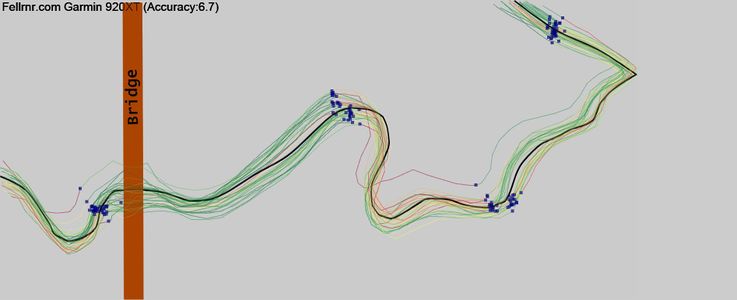 The 920xt does surprisingly well under the bridge and no issues reacquiring the GPS signal. It does poorly around the twisty section, often cutting the corners which results in a short measurement. It does okay with the sharp turn seen on the right side of the diagram. Notice that the tracks are quite spread out, especially if you compare them with the TomTom's tracks. (This diagram has tracks color coded with green indicating good accuracy through to read indicating poor accuracy, and the lap markers as blue dots.) |
|
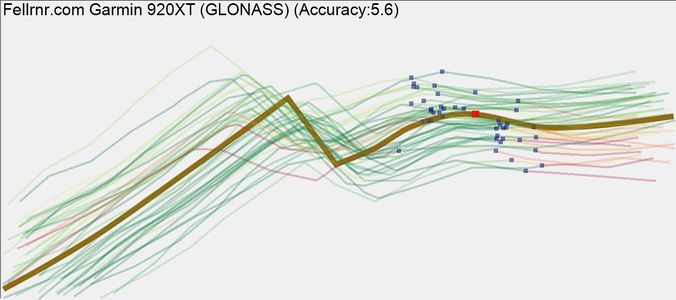 In the close up with GLONAS, the lap markers are slightly more distributed. If you look at the image below that shows direction of travel as color, you can see that the 920XT with GLONAS is having accuracy problems in the section to the right of the diagram, but only when traveling east-to-west. This is a surprisingly common phenomenon, where a watch has a dramatic difference in accuracy depending on the direction of travel. (This diagram has tracks color coded with green indicating good accuracy through to read indicating poor accuracy, and the lap markers as blue dots.) | |
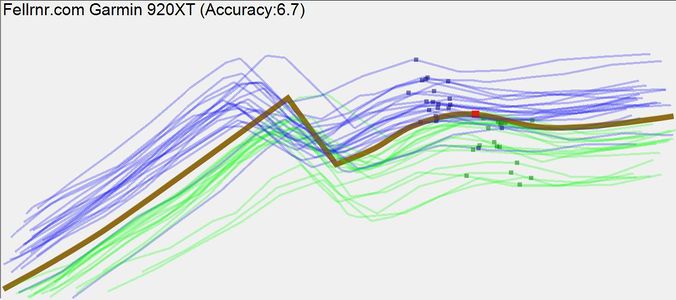 Here the 920XT displays the typical GPS behavior with the tracks that have the green lines shifted slightly down and to the left, blue up and to the right. You can see the lap markers similarly shifted. (This image has the tracks color-coded for direction, with green coming from the right, blue from the left.) |
7 Comparison Table
I evaluate running watches in three distinct ways. Firstly, you can use a watch on its own, without any kind of Footpod. This is probably the most common way runners use their watch, but you miss out on a lot. The second rating is with a standard Footpod that is available quite cheaply. These Footpod's can be reasonably accurate once the calibrated, but calibration is a little tedious. The final evaluation is with the Stryd Footpod, which is vastly more accurate than any other type of Footpod, or and more accurate than GPS. The table below looks at the score, and the value for money of each watch for each of the three conditions. (I’ve also tested the Apple Watch 3, but I’ve not included it in these tables as it’s not really a running watch.)
| Review | With Stryd Score | With Stryd Value for money | With Footpod Score | With Footpod Value for money | Without Footpod Score | Without Footpod Value for money | Price at Amazon.com |
|---|---|---|---|---|---|---|---|
| Garmin Epix Review | 47 | 4.5 | 31 | 3.9 | 23 | 3.4 | Error: Could not parse data from Amazon! |
| Garmin Fenix 5X Review | 47 | 2.9 | 32 | 2.3 | 24 | 1.9 | Error: Could not parse data from Amazon! |
| Garmin Fenix 3 Review | 45 | 3.8 | 28 | 3.1 | 24 | 3 | Error: Could not parse data from Amazon! |
| Garmin 935 Review | 45 | 3.6 | 30 | 3 | 22 | 2.4 | Error: Could not parse data from Amazon! |
| Garmin Vivoactive HR Review | 40 | 4.9 | 21 | 3.8 | 17 | 3.8 | Error: Could not parse data from Amazon! |
| Garmin 920XT Review | 39 | 4.4 | 30 | 4.7 | 24 | 4.5 | Error: Could not parse data from Amazon! |
| Suunto Spartan Ultra Review | 37 | 2.6 | 27 | 2.3 | 23 | 2.1 | Error: Could not parse data from Amazon! |
| Garmin Vivoactive 3 Review | 36 | 4 | 19 | 2.9 | 15 | 2.8 | Error: Could not parse data from Amazon! |
| Garmin Vivoactive Review | 34 | 5.1 | 14 | 3.4 | 10 | 3.3 | Error: Could not parse data from Amazon! |
| Suunto Spartan Trainer Review | 34 | 3.9 | 23 | 3.7 | 18 | 3.4 | Error: Could not parse data from Amazon! |
| Polar V800 Review | 33 | 2.8 | 26 | 2.8 | 22 | 2.7 | Error: Could not parse data from Amazon! |
| Suunto Ambit2 Review | 32 | 3.9 | 25 | 4.3 | 21 | 4.5 | Error: Could not parse data from Amazon! |
| Suunto Ambit3 Peak Review | 32 | 3.4 | 29 | 4.1 | 25 | 4.2 | Error: Could not parse data from Amazon! |
| Garmin Fenix 2 Review | 31 | 2.9 | 22 | 2.7 | 18 | 2.5 | Error: Could not parse data from Amazon! |
| Suunto Ambit3 Run Review | 30 | 4 | 27 | 5.5 | 23 | 5.9 | Error: Could not parse data from Amazon! |
| Suunto Ambit2 R Review | 30 | 3.5 | 23 | 3.8 | 19 | 3.8 | Error: Could not parse data from Amazon! |
| Garmin 235 Review | 28 | 2.9 | 20 | 2.8 | 12 | 2 | Error: Could not parse data from Amazon! |
| Garmin 620 Review | 27 | 3.8 | 24 | 5.1 | 20 | 5.6 | Error: Could not parse data from Amazon! |
| Garmin 910XT Review | 26 | 3.9 | 26 | 6.1 | 21 | 6.7 | Error: Could not parse data from Amazon! |
| Garmin 310XT Review | 25 | 4.6 | 24 | 8.3 | 18 | 10 | Error: Could not parse data from Amazon! |
| Polar M400 Review | 25 | 4.3 | 15 | 4.5 | 11 | 4.9 | Error: Could not parse data from Amazon! |
| Garmin 225 Review | 25 | 3.8 | 13 | 3.1 | 9 | 2.9 | Error: Could not parse data from Amazon! |
| TomTom Cardio Runner Review | 25 | 3.3 | 10 | 2 | 10 | 2.5 | Error: Could not parse data from Amazon! |
| Polar M430 Review | 25 | 3.2 | 15 | 2.9 | 11 | 2.7 | Error: Could not parse data from Amazon! |
| Garmin 610 Review | 24 | 3.3 | 20 | 4.3 | 14 | 3.9 | Error: Could not parse data from Amazon! |
| Leikr Review | 10 | 1 | 20 | 2.5 | 14 | 2 | Leikr ($380) |
| Epson SF-510 Review | 4 | 0.7 | 6 | 2 | 6 | 3 | Error: Could not parse data from Amazon! |
| Epson SF-810 Review | 4 | 0.6 | 6 | 1.6 | 6 | 2.3 | Error: Could not parse data from Amazon! |
| Garmin 10 Review | 2 | 0.3 | 2 | 0.6 | 2 | 0.9 | Error: Could not parse data from Amazon! |
The score is the sum of how well each watch can answer the four basic questions (how far, how fast, where are you, what's your cadence), plus some bonus points.
- The "How far you've run" will be based on GPS only for "without Footpod" and "with Standard Footpod", but based on Stryd if supported in the "with Stryd Footpod" table..
- How fast you're running assumes you're using a Footpod if it's supported, otherwise the rating is 0-2 based on GPS accuracy.
- The "Where are you?" is based on various navigation features such as back to start, breadcrumbs, and preloaded maps. For some watches, you have to turn GPS off to get the benefit of Stryd, so those watches have worse "where are you scores" with Stryd than without.
- The cadence score uses 1 point for an internal cadence sensor, 2 points for footpod support, 1 point for support from chest strap cadence, and 1 point for cadence alerts.
- I give 1-2 bonus points for application support, 1-2 bonus points for data upload, 1-2 bonus points for Optical Heart Rate Monitoring, and 0-1 bonus points for battery life.
- Value for money is the score divided by the price (at the time I last updated the table.) Your needs may be different, so you might weight the different aspects of the watches differently, or be basing your decision on different criteria totally. Hopefully this table will give you a good starting point for your decision.
7.1 Score Breakdown without a Footpod
| Review | Score | Value for money6 | How far did you run?1 |
How fast are you running?2 |
Where are you?3 |
What's your cadence?4 |
Bonus Points5 | class="unsortable" |
Price at Amazon.com |
|---|---|---|---|---|---|---|---|---|
| Suunto Ambit3 Peak Review | 25 | 4.2 | 8 | 3 | 6 | 2 | 6 | Error: Could not parse data from Amazon! |
| Garmin 920XT Review | 24 | 4.5 | 1 | 2 | 7 | 6 | 8 | Error: Could not parse data from Amazon! |
| Garmin Fenix 3 Review | 24 | 3 | 2 | 1 | 7 | 6 | 8 | Error: Could not parse data from Amazon! |
| Garmin Fenix 5X Review | 24 | 1.9 | 1 | 0 | 9 | 6 | 8 | Error: Could not parse data from Amazon! |
| Suunto Ambit3 Run Review | 23 | 5.9 | 8 | 3 | 5 | 2 | 5 | Error: Could not parse data from Amazon! |
| Garmin Epix Review | 23 | 3.4 | 0 | 0 | 9 | 6 | 8 | Error: Could not parse data from Amazon! |
| Suunto Spartan Ultra Review | 23 | 2.1 | 8 | 2 | 6 | 2 | 5 | Error: Could not parse data from Amazon! |
| Polar V800 Review | 22 | 2.7 | 9 | 4 | 3 | 2 | 4 | Error: Could not parse data from Amazon! |
| Garmin 935 Review | 22 | 2.4 | 1 | 0 | 7 | 6 | 8 | Error: Could not parse data from Amazon! |
| Garmin 910XT Review | 21 | 6.7 | 5 | 3 | 6 | 2 | 5 | Error: Could not parse data from Amazon! |
| Suunto Ambit2 Review | 21 | 4.5 | 4 | 3 | 6 | 2 | 6 | Error: Could not parse data from Amazon! |
| Garmin 620 Review | 20 | 5.6 | 3 | 2 | 2 | 6 | 7 | Error: Could not parse data from Amazon! |
| Suunto Ambit2 R Review | 19 | 3.8 | 4 | 3 | 5 | 2 | 5 | Error: Could not parse data from Amazon! |
| Garmin 310XT Review | 18 | 10 | 7 | 2 | 4 | 0 | 5 | Error: Could not parse data from Amazon! |
| Suunto Spartan Trainer Review | 18 | 3.4 | 5 | 3 | 4 | 2 | 4 | Error: Could not parse data from Amazon! |
| Garmin Fenix 2 Review | 18 | 2.5 | 1 | 0 | 6 | 6 | 5 | Error: Could not parse data from Amazon! |
| Garmin Vivoactive HR Review | 17 | 3.8 | 0 | 0 | 2 | 6 | 9 | Error: Could not parse data from Amazon! |
| Garmin Vivoactive 3 Review | 15 | 2.8 | 0 | 0 | 4 | 4 | 7 | Error: Could not parse data from Amazon! |
| Garmin 610 Review | 14 | 3.9 | 3 | 2 | 3 | 2 | 4 | Error: Could not parse data from Amazon! |
| Leikr Review | 14 | 2 | 5 | 2 | 4 | 0 | 3 | Leikr ($380) |
| Garmin 235 Review | 12 | 2 | 0 | 0 | 2 | 2 | 8 | Error: Could not parse data from Amazon! |
| Polar M400 Review | 11 | 4.9 | 3 | 1 | 1 | 2 | 4 | Error: Could not parse data from Amazon! |
| Polar M430 Review | 11 | 2.7 | 3 | 1 | 1 | 2 | 4 | Error: Could not parse data from Amazon! |
| Garmin Vivoactive Review | 10 | 3.3 | 0 | 0 | 0 | 6 | 4 | Error: Could not parse data from Amazon! |
| TomTom Cardio Runner Review | 10 | 2.5 | 2 | 1 | 0 | 2 | 5 | Error: Could not parse data from Amazon! |
| Garmin 225 Review | 9 | 2.9 | 1 | 1 | 0 | 2 | 5 | Error: Could not parse data from Amazon! |
| Epson SF-510 Review | 6 | 3 | 0 | 0 | 0 | 2 | 4 | Error: Could not parse data from Amazon! |
| Epson SF-810 Review | 6 | 2.3 | 1 | 0 | 0 | 2 | 3 | Error: Could not parse data from Amazon! |
| Garmin 10 Review | 2 | 0.9 | 0 | 0 | 0 | 0 | 2 | Error: Could not parse data from Amazon! |
7.2 Score Breakdown with a Standard Footpod
| Review | Score | Value for money6 | How far did you run?1 |
How fast are you running?2 |
Where are you?3 |
What's your cadence?4 |
Bonus Points5 | class="unsortable" |
Price at Amazon.com |
|---|---|---|---|---|---|---|---|---|
| Garmin Fenix 5X Review | 32 | 2.3 | 1 | 4 | 9 | 10 | 8 | Error: Could not parse data from Amazon! |
| Garmin Epix Review | 31 | 3.9 | 0 | 4 | 9 | 10 | 8 | Error: Could not parse data from Amazon! |
| Garmin 920XT Review | 30 | 4.7 | 1 | 4 | 7 | 10 | 8 | Error: Could not parse data from Amazon! |
| Garmin 935 Review | 30 | 3 | 1 | 4 | 7 | 10 | 8 | Error: Could not parse data from Amazon! |
| Suunto Ambit3 Peak Review | 29 | 4.1 | 8 | 3 | 6 | 6 | 6 | Error: Could not parse data from Amazon! |
| Garmin Fenix 3 Review | 28 | 3.1 | 2 | 1 | 7 | 10 | 8 | Error: Could not parse data from Amazon! |
| Suunto Ambit3 Run Review | 27 | 5.5 | 8 | 3 | 5 | 6 | 5 | Error: Could not parse data from Amazon! |
| Suunto Spartan Ultra Review | 27 | 2.3 | 8 | 2 | 6 | 6 | 5 | Error: Could not parse data from Amazon! |
| Garmin 910XT Review | 26 | 6.1 | 5 | 4 | 6 | 6 | 5 | Error: Could not parse data from Amazon! |
| Polar V800 Review | 26 | 2.8 | 9 | 4 | 3 | 6 | 4 | Error: Could not parse data from Amazon! |
| Suunto Ambit2 Review | 25 | 4.3 | 4 | 3 | 6 | 6 | 6 | Error: Could not parse data from Amazon! |
| Garmin 310XT Review | 24 | 8.3 | 7 | 4 | 4 | 4 | 5 | Error: Could not parse data from Amazon! |
| Garmin 620 Review | 24 | 5.1 | 3 | 2 | 2 | 10 | 7 | Error: Could not parse data from Amazon! |
| Suunto Ambit2 R Review | 23 | 3.8 | 4 | 3 | 5 | 6 | 5 | Error: Could not parse data from Amazon! |
| Suunto Spartan Trainer Review | 23 | 3.7 | 5 | 4 | 4 | 6 | 4 | Error: Could not parse data from Amazon! |
| Garmin Fenix 2 Review | 22 | 2.7 | 1 | 0 | 6 | 10 | 5 | Error: Could not parse data from Amazon! |
| Garmin Vivoactive HR Review | 21 | 3.8 | 0 | 0 | 2 | 10 | 9 | Error: Could not parse data from Amazon! |
| Garmin 610 Review | 20 | 4.3 | 3 | 4 | 3 | 6 | 4 | Error: Could not parse data from Amazon! |
| Garmin 235 Review | 20 | 2.8 | 0 | 4 | 2 | 6 | 8 | Error: Could not parse data from Amazon! |
| Leikr Review | 20 | 2.5 | 5 | 4 | 4 | 4 | 3 | Leikr ($380) |
| Garmin Vivoactive 3 Review | 19 | 2.9 | 0 | 0 | 4 | 8 | 7 | Error: Could not parse data from Amazon! |
| Polar M400 Review | 15 | 4.5 | 3 | 1 | 1 | 6 | 4 | Error: Could not parse data from Amazon! |
| Polar M430 Review | 15 | 2.9 | 3 | 1 | 1 | 6 | 4 | Error: Could not parse data from Amazon! |
| Garmin Vivoactive Review | 14 | 3.4 | 0 | 0 | 0 | 10 | 4 | Error: Could not parse data from Amazon! |
| Garmin 225 Review | 13 | 3.1 | 1 | 1 | 0 | 6 | 5 | Error: Could not parse data from Amazon! |
| TomTom Cardio Runner Review | 10 | 2 | 2 | 1 | 0 | 2 | 5 | Error: Could not parse data from Amazon! |
| Epson SF-510 Review | 6 | 2 | 0 | 0 | 0 | 2 | 4 | Error: Could not parse data from Amazon! |
| Epson SF-810 Review | 6 | 1.6 | 1 | 0 | 0 | 2 | 3 | Error: Could not parse data from Amazon! |
| Garmin 10 Review | 2 | 0.6 | 0 | 0 | 0 | 0 | 2 | Error: Could not parse data from Amazon! |
7.3 Score Breakdown with a Stryd Footpod
| Review | Score | Value for money6 | How far did you run?1 |
How fast are you running?2 |
Where are you?3 |
What's your cadence?4 |
Bonus Points5 | class="unsortable" |
Price at Amazon.com |
|---|---|---|---|---|---|---|---|---|
| Garmin Epix Review | 47 | 4.5 | 10 | 10 | 9 | 10 | 8 | Error: Could not parse data from Amazon! |
| Garmin Fenix 5X Review | 47 | 2.9 | 10 | 10 | 9 | 10 | 8 | Error: Could not parse data from Amazon! |
| Garmin Fenix 3 Review | 45 | 3.8 | 10 | 10 | 7 | 10 | 8 | Error: Could not parse data from Amazon! |
| Garmin 935 Review | 45 | 3.6 | 10 | 10 | 7 | 10 | 8 | Error: Could not parse data from Amazon! |
| Garmin Vivoactive HR Review | 40 | 4.9 | 10 | 10 | 1 | 10 | 9 | Error: Could not parse data from Amazon! |
| Garmin 920XT Review | 39 | 4.4 | 10 | 10 | 1 | 10 | 8 | Error: Could not parse data from Amazon! |
| Suunto Spartan Ultra Review | 37 | 2.6 | 10 | 10 | 6 | 6 | 5 | Error: Could not parse data from Amazon! |
| Garmin Vivoactive 3 Review | 36 | 4 | 10 | 10 | 1 | 8 | 7 | Error: Could not parse data from Amazon! |
| Garmin Vivoactive Review | 34 | 5.1 | 10 | 10 | 0 | 10 | 4 | Error: Could not parse data from Amazon! |
| Suunto Spartan Trainer Review | 34 | 3.9 | 10 | 10 | 4 | 6 | 4 | Error: Could not parse data from Amazon! |
| Polar V800 Review | 33 | 2.8 | 10 | 10 | 3 | 6 | 4 | Error: Could not parse data from Amazon! |
| Suunto Ambit2 Review | 32 | 3.9 | 10 | 10 | 6 | 0 | 6 | Error: Could not parse data from Amazon! |
| Suunto Ambit3 Peak Review | 32 | 3.4 | 10 | 10 | 6 | 0 | 6 | Error: Could not parse data from Amazon! |
| Garmin Fenix 2 Review | 31 | 2.9 | 10 | 10 | 6 | 0 | 5 | Error: Could not parse data from Amazon! |
| Suunto Ambit3 Run Review | 30 | 4 | 10 | 10 | 5 | 0 | 5 | Error: Could not parse data from Amazon! |
| Suunto Ambit2 R Review | 30 | 3.5 | 10 | 10 | 5 | 0 | 5 | Error: Could not parse data from Amazon! |
| Garmin 235 Review | 28 | 2.9 | 10 | 10 | 0 | 0 | 8 | Error: Could not parse data from Amazon! |
| Garmin 620 Review | 27 | 3.8 | 10 | 10 | 0 | 0 | 7 | Error: Could not parse data from Amazon! |
| Garmin 910XT Review | 26 | 3.9 | 10 | 10 | 1 | 0 | 5 | Error: Could not parse data from Amazon! |
| Garmin 310XT Review | 25 | 4.6 | 10 | 10 | 0 | 0 | 5 | Error: Could not parse data from Amazon! |
| Polar M400 Review | 25 | 4.3 | 10 | 10 | 1 | 0 | 4 | Error: Could not parse data from Amazon! |
| Garmin 225 Review | 25 | 3.8 | 10 | 10 | 0 | 0 | 5 | Error: Could not parse data from Amazon! |
| TomTom Cardio Runner Review | 25 | 3.3 | 10 | 10 | 0 | 0 | 5 | Error: Could not parse data from Amazon! |
| Polar M430 Review | 25 | 3.2 | 10 | 10 | 1 | 0 | 4 | Error: Could not parse data from Amazon! |
| Garmin 610 Review | 24 | 3.3 | 10 | 10 | 0 | 0 | 4 | Error: Could not parse data from Amazon! |
| Leikr Review | 10 | 1 | 5 | 2 | 0 | 0 | 3 | Leikr ($380) |
| Epson SF-510 Review | 4 | 0.7 | 0 | 0 | 0 | 0 | 4 | Error: Could not parse data from Amazon! |
| Epson SF-810 Review | 4 | 0.6 | 1 | 0 | 0 | 0 | 3 | Error: Could not parse data from Amazon! |
| Garmin 10 Review | 2 | 0.3 | 0 | 0 | 0 | 0 | 2 | Error: Could not parse data from Amazon! |
7.4 Basic Features
|
Review |
Released | GPS Accuracy |
Weight (oz) | Size (CM3) | Display (mm) | Resolution (Pixels) | Waterproofing | Heart Rate Monitor |
Cadence | Data Upload |
|---|---|---|---|---|---|---|---|---|---|---|
| Garmin Epix Review | 2015 | 6.2 | 3.0 | 48 | 29 x 21 (609mm2) | 205 x 148 (30.3K total) | Good (50m) | Yes | Internal/Footpod/Heart Rate Monitor/Alert | Yes |
| Garmin Fenix 5X Review | 2017 | 5.6 | 3.5 | 36 | 30.5 (round) (731mm2) | 240 diameter (45.2K total) | Good (100m) | Yes | Internal/Footpod/Heart Rate Monitor/Alert | Yes |
| Garmin Fenix 3 Review | 2015 | 6.2 | 2.9 | 33 | 30 (round) (726mm2) | 218 diameter (37.3K total) | Good (100m) | Yes | Internal/Footpod/Heart Rate Monitor/Alert | Yes |
| Garmin 935 Review | 2017 | 5.6 | 1.7 | 24 | 30.5 (round) (731mm2) | 240 diameter (45.2K total) | Good (100m) | Yes | Internal/Footpod/Heart Rate Monitor/Alert | Yes |
| Garmin Vivoactive HR Review | 2016 | 4.9 | 1.7 | 19 | 21 x 29 (609mm2) | 148 x 205 (30.3K total) | Good (50m) | Yes (+OHRM) | Internal/Footpod/Heart Rate Monitor/Alert | Yes |
| Garmin 920XT Review | 2014 | 6.6 | 2.2 | 35 | 29 x 21 (609mm2) | 205 x 148 (30.3K total) | Good (50m) | Yes | Internal/Footpod/Heart Rate Monitor/Alert | Yes |
| Garmin Vivoactive 3 Review | 2017 | 1.5 | 17 | 30.5 (round) (731mm2) | 240 diameter (45.2K total) | Good (50m) | Yes (+OHRM) | Internal/Footpod | Yes | |
| Garmin Vivoactive Review | 2015 | 5.4 | 1.3 | 13 | 29 x 21 (592mm2) | 205 x 148 (30.3K total) | Good (50m) | Yes | Internal/Footpod/Heart Rate Monitor/Alert | Yes |
| Suunto Spartan Trainer Review | 2017 | 7.8 | 2.0 | 25 | 24 x 23 (529mm2) | 128 diameter (12.9K total) | Good (50m) | Yes (+OHRM) | Internal/Footpod | Yes |
| Suunto Ambit2 Review | 2013 | 7.6 | 3.1 | 30 | 29 (round) (661mm2) | 128 diameter (12.9K total) | Good (100m) | Yes | Internal/Footpod | Yes |
| Suunto Ambit3 Peak Review | 2014 | 7.9 | 2.9 | 30 | 29 (round) (661mm2) | 128 diameter (12.9K total) | Good (100m) | Yes | Internal/Footpod | Yes |
| Suunto Spartan Ultra Review | 2016 | 7.1 | 2.7 | 38 | 32 (round) (804mm2) | 320 diameter (80.4K total) | Good (100m) | Yes | Internal (Limited Footpod) | Yes |
| Garmin Fenix 2 Review | 2014 | 5.7 | 3.2 | 32 | 31 (round) (755mm2) | 70 diameter (3.8K total) | Good (50m) | Yes | Internal/Footpod/Heart Rate Monitor/Alert | Yes |
| Suunto Ambit3 Run Review | 2014 | 7.9 | 2.5 | 30 | 29 (round) (661mm2) | 128 x 128 (16.4K total) | Good (50m) | Yes | Internal/Footpod | Yes |
| Suunto Ambit2 R Review | 2013 | 7.6 | 2.5 | 30 | 29 (round) (661mm2) | 128 diameter (12.9K total) | Good (50m) | Yes | Internal/Footpod | Yes |
| Garmin 235 Review | 2015 | 4.9 | 1.5 | 19 | 31 (round) (755mm2) | 215 diameter (36.3K total) | Good (50m) | Yes (+OHRM) | Internal/Footpod | Yes |
| Garmin 620 Review | 2013 | 7.1 | 1.5 | 20 | 25.4 (round) (507mm2) | 180 diameter (25.4K total) | Good (50m) | Yes | Internal/Footpod/Heart Rate Monitor/Alert | Yes |
| Garmin 910XT Review | 2011 | 7.5 | 2.5 | 49 | 33 x 20 (660mm2) | 160 x 100 (16K total) | Good (50m) | Yes | Footpod/Alert | Yes |
| Garmin 310XT Review | 2009 | 7.5 | 2.5 | 63 | 33 x 20 (660mm2) | 160 x 100 (16K total) | Good (50m) | Yes | Footpod | Yes |
| Garmin 225 Review | 2015 | 6.2 | 1.5 | 24 | 25.4 (round) (507mm2) | 180 diameter (25.4K total) | Good (50m) | Yes (+OHRM) | Internal/Footpod | Yes |
| TomTom Cardio Runner Review | 2015 | 6.0 | 2.2 | 30 | 22 x 25 (550mm2) | 144 x 168 (24.2K total) | Good (50m) | Yes (+OHRM) | Internal/Footpod | Yes |
| Polar V800 Review | 2014 | 8.0 | 2.8 | 31 | 23 x 23 (529mm2) | 128 x 128 (16.4K total) | Good (30m) | Yes | Internal/Footpod | Yes |
| Polar M430 Review | 2017 | 7.2 | 2.0 | 24 | 23 x 23 (529mm2) | 128 x 128 (16.4K total) | Good (50m) | Yes (+OHRM) | Internal/Footpod | Yes |
| Polar M400 Review | 2014 | 6.6 | 2.0 | 24 | 23 x 23 (529mm2) | 128 x 128 (16.4K total) | Good (30m) | Yes | Internal/Footpod | Yes |
| Garmin 610 Review | 2011 | 7.3 | 2.5 | 41 | 25.4 (round) (507mm2) | 128 diameter (12.9K total) | Fair (IPX7) | Yes | Footpod/Alert | Yes |
| Leikr Review | 2013 | 7.3 | 2.4 | 25 | 41 x 31 (1271mm2) | 206 x 148 (76.8K total) | Fair (IPX6) | Yes | Footpod | Limited |
| Epson SF-510 Review | 2015 | 4.4 | 1.7 | 24 | 28 x 22 (616mm2) | 128 x 96 (12.3K total) | Good (50m) | Yes | Limited Internal | Limited |
| Epson SF-810 Review | 2015 | 5.5 | 1.8 | 28 | 28 (round) (616mm2) | 128 diameter (12.9K total) | Good (50m) | OHRM Only) | Limited Internal | Limited |
| Garmin 10 Review | 2012 | 3.8 | 1.3 | 33 | 25 x 24 (600mm2) | 55 x 32 (1.8K total) | Good (50m) | No | No | Yes |
|
Review |
Battery Life (hr) |
Tested Battery Life (hr) |
Extended Battery Life (hr) |
Charge On The Run? | Training Effect |
HRV | GPS cache | Sensors |
|---|---|---|---|---|---|---|---|---|
| Garmin Epix Review | 24 | 17.6 | 50 | Yes (with USB=Garmin) | Yes | Record | Yes | Ant+ |
| Garmin Fenix 5X Review | 20 | 23 | 35 | Yes, but can't be worn | Yes | Record | Yes | Bluetooth/Ant+ |
| Garmin Fenix 3 Review | 20 | 22 | 50 | Yes (with USB=Garmin) | Yes | No | Yes | Ant+ |
| Garmin 935 Review | 24 | 24.5 | 60 | Yes, but can't be worn | Yes | Record | Yes | Bluetooth/Ant+ |
| Garmin Vivoactive HR Review | 13 | 13 | Yes (with USB=Garmin) | No | No | Yes | Ant+ | |
| Garmin 920XT Review | 24 | 19 | 40 | No (terminates) | Yes | Record | Yes | Ant+ |
| Garmin Vivoactive 3 Review | 13 | 13 | No | Yes | Bluetooth/Ant+ | |||
| Garmin Vivoactive Review | 10 | 10 | 10 | Yes (with USB=Garmin) | No | No | Yes | Ant+ |
| Suunto Spartan Trainer Review | 10 | 11 | 30 | Yes | Yes | No | Yes | Bluetooth |
| Suunto Ambit2 Review | 15 | 50 | Yes | Yes | Record | Yes | Ant+ | |
| Suunto Ambit3 Peak Review | 20 | 100 | Yes | Yes | Record | Yes | Bluetooth | |
| Suunto Spartan Ultra Review | 18 | 17 | 26 | Yes, but can't be worn | Yes | Record | Yes | Bluetooth |
| Garmin Fenix 2 Review | 15 | 50 | Yes (with USB=Garmin) | Yes | No | Yes | Ant+ | |
| Suunto Ambit3 Run Review | 10 | 10.5 | 100 | Yes | Yes | Record | Yes | Bluetooth |
| Suunto Ambit2 R Review | 8 | 7.3 | 25 | Yes | Yes | Record | Yes | Ant+ |
| Garmin 235 Review | 11 | 11 | Yes, but no optical HR | Yes | No | Yes | Ant+ | |
| Garmin 620 Review | 10 | 10 | No (resets) | Yes | Record | Yes | Ant+ | |
| Garmin 910XT Review | 20 | 20 | Yes, but no display | Yes | Record | No | Ant+ | |
| Garmin 310XT Review | 20 | 20 | Yes, but no display | No | No | No | Ant+ | |
| Garmin 225 Review | 10 | 11 | 10 | No (resets) | No | No | Yes | Ant+ |
| TomTom Cardio Runner Review | 8 | 6.3 | 8 | No (resets) | No | No | Yes | Bluetooth HR |
| Polar V800 Review | 13 | 24 | 50 | No (terminates) | Yes | Display | Predictive | Bluetooth |
| Polar M430 Review | 8 | 8 | 8 | No | No | No | Yes | Bluetooth |
| Polar M400 Review | 8 | 8 | Yes, but can't be worn | No | No | No | Bluetooth | |
| Garmin 610 Review | 8 | 8 | Yes, but no display | Yes | Record | No | Ant+ | |
| Leikr Review | 5 | 6.5 | 5 | Yes, but can't be worn | No | No | Yes (few hours) | Ant+ |
| Epson SF-510 Review | 30 | 30 | 30 | No | No | No | Yes (few hours) | Bluetooth HR |
| Epson SF-810 Review | 20 | 26 | 20 | No | No | No | Yes (few hours) | None |
| Garmin 10 Review | 5 | 5 | No | No | No | No | None |
|
Review |
Color Maps | Breadcrumbs | Courses | To Waypoint | Compass | Reverse course | Beeline to start | Connect IQ | Altimeter |
|---|---|---|---|---|---|---|---|---|---|
| Garmin Epix Review | Yes | Yes | Yes | Yes | Yes | Yes | No | Yes | Yes |
| Garmin Fenix 5X Review | Yes | Yes | Yes | Yes | Yes | Yes | No | No | Yes |
| Garmin Fenix 3 Review | No | Yes | Yes | Yes | Yes | Yes | No | Yes | Yes |
| Garmin 935 Review | No | Yes | Yes | Yes | Yes | Yes | No | No | Yes |
| Garmin Vivoactive HR Review | No | No | No | No | No | No | No | Yes | Yes |
| Garmin 920XT Review | No | Yes | Yes | Yes | Yes | Yes | No | Yes | Yes |
| Garmin Vivoactive 3 Review | No | No | No | No | No | No | No | No | No |
| Garmin Vivoactive Review | No | No | No | No | No | No | Yes | Yes | No |
| Suunto Spartan Trainer Review | No | No | No | No | No | No | Yes | No | No |
| Suunto Ambit2 Review | No | No | Yes | Yes | Yes | Yes | Yes | No | Yes |
| Suunto Ambit3 Peak Review | No | No | Yes | Yes | Yes | Yes | Yes | No | Yes |
| Suunto Spartan Ultra Review | No | Yes | Yes | Yes | Yes | No | Yes | Yes | Yes |
| Garmin Fenix 2 Review | No | Yes | Yes | Yes | Yes | Yes | No | No | Yes |
| Suunto Ambit3 Run Review | No | No | Yes | Yes | Yes | Yes | Yes | No | No |
| Suunto Ambit2 R Review | No | No | Yes | Yes | Yes | Yes | Yes | No | No |
| Garmin 235 Review | No | No | No | No | No | No | Yes | Yes | No |
| Garmin 620 Review | No | No | No | No | No | No | No | No | No |
| Garmin 910XT Review | No | Yes | Yes | Yes | No | Yes | Yes | No | Yes |
| Garmin 310XT Review | No | Yes | Yes | Yes | No | Yes | No | No | No |
| Garmin 225 Review | No | No | No | No | No | No | No | No | No |
| TomTom Cardio Runner Review | No | No | No | No | No | No | No | No | No |
| Polar V800 Review | No | No | Yes | No | No | No | Yes | No | Yes |
| Polar M430 Review | No | No | No | No | No | No | Yes | No | No |
| Polar M400 Review | No | No | No | No | No | No | Yes | No | No |
| Garmin 610 Review | No | No | Yes | Yes | No | No | Yes | No | No |
| Leikr Review | Yes | Yes | Yes | No | No | No | No | No | No |
| Epson SF-510 Review | No | No | No | No | No | No | No | No | No |
| Epson SF-810 Review | No | No | No | No | No | No | No | No | No |
| Garmin 10 Review | No | No | No | No | No | No | No | No | No |
For "navigation":
- Color Maps gives you full color maps, rather like a smart phone, with roads and paths marked out.
- Track Outline is a display of where you've run, rather like a breadcrumb trail. If there are maps, the outline is superimposed otherwise this is just the outline on its own without any context.
- Course Outline is an outline of a route that can be downloaded. I've found this useful during ultras or in unfamiliar cities where I've needed to know where to go.
- Back To Start is a simple arrow point to your starting point, so it won't help you backtrack.
- Back To Waypoint returns you to a previously marked location using a simple arrow to point.
- Compass. A magnetic compass can help you orient yourself or the map. Without a magnetic compass you have to be moving for the GPS to give you a sense of direction.
(Older Reviews: Polar RC3 GPS, Soleus 1.0, Motorola Motoactv.)
